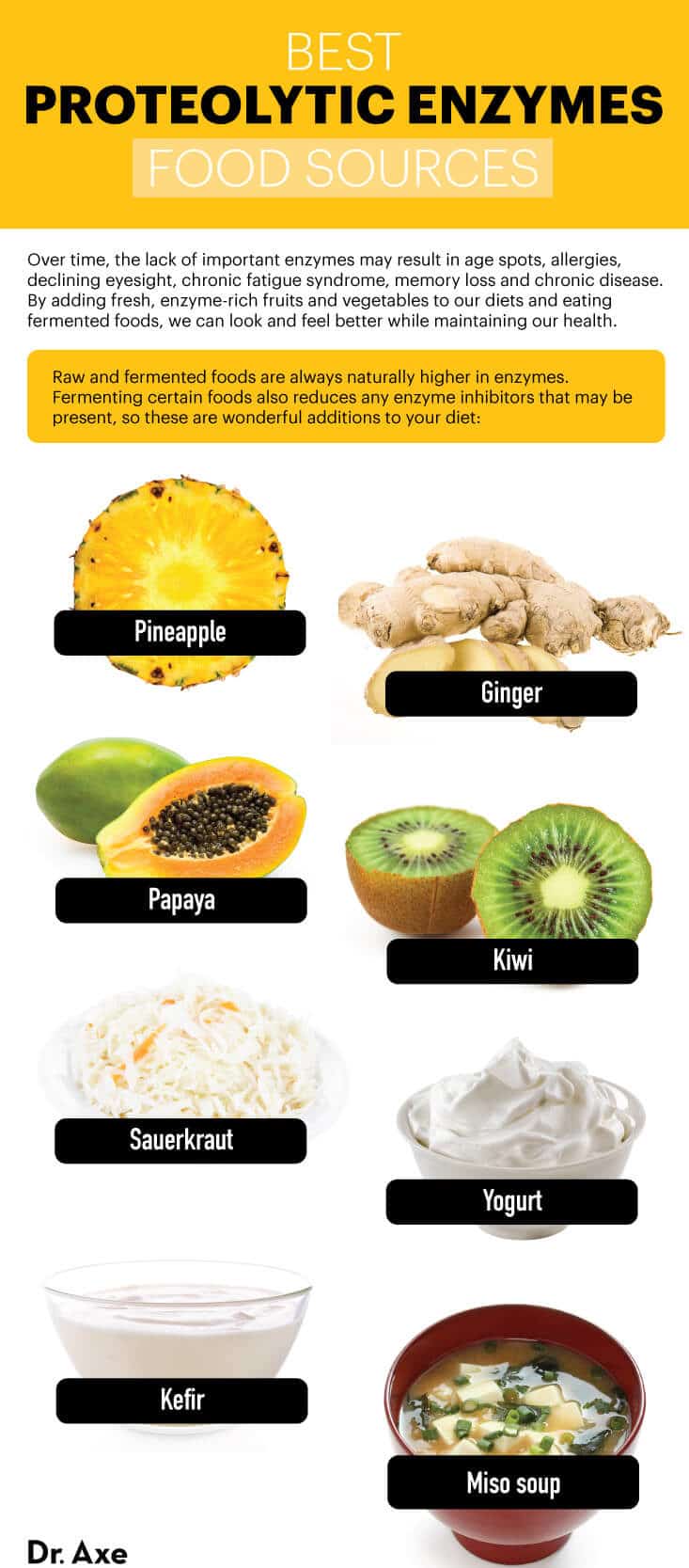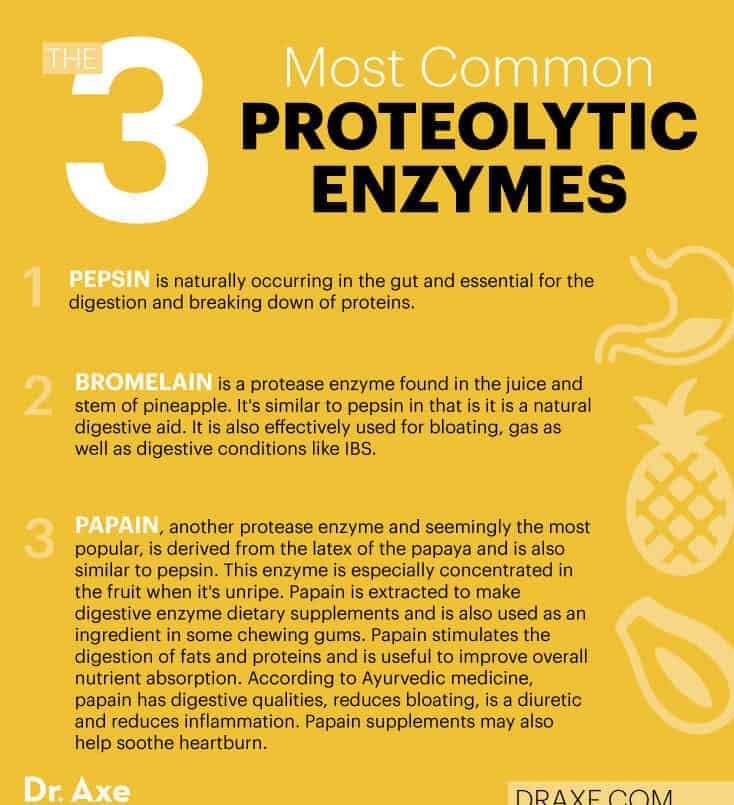See other Science/Tech Articles
Title: Proteolytic Enzymes Reduce Inflammation and Boost Immunity
Source:
[None]
URL Source: https://draxe.com/nutrition/proteolytic-enzymes/
Published: Apr 30, 2022
Author: Horse
Post Date: 2022-04-30 11:14:13 by Horse
Keywords: None
Views: 385
Comments: 1
All of the vitamins and minerals we eat, plus all of the hormones our bodies produce, need enzymes in order to work properly. Additionally, enzymes, such as proteolytic enzymes, regulate metabolic functions and assist in maintaining our stamina and energy levels. Proteolytic enzymes are the type that specifically aid in the digestion process. They help digest proteins in our diets, breaking them down into smaller units called amino acids. Overall, these enzymes have many roles, including: supporting immune function encouraging healing of tissues and muscle recovery aiding in many functions of the digestive system Enzymes can be taken as supplements, but better yet, they can also be found naturally in certain foods. Which fruits and other foods contain proteolytic enzymes? A great example is papaya, which supplies the proteolytic enzyme called papain, an enzyme that is also used today as a popular meat tenderizer. What Are Proteolytic Enzymes? Roles in the Body and How They Work Proteolytic enzymes are defined as a group of enzymes that break the long chain-like molecules of proteins into shorter fragments (peptides) and eventually into their components, amino acids. Sometimes proteolytic enzymes are called protease, proteinase or peptidase. Your digestive tract produces a number of essential types of enzymes. The major categories of proteolytic enzymes include: Exopeptidases, which work at the ends of proteins. Endopeptidases, which have catalytic mechanisms and work at various sites. Examples of endopeptidases include pepsin, aspartic, cysteine, glutamic, metalloendopeptidases, serine and threonine endopeptidases. Proteolytic enzymes are present in many different species, including humans, bacteria, archaea, algae, some viruses, plants and various animals. Why is it so difficult then to get these much-needed enzymes from the diet? When we eat foods that have been cooked or processed, we lose the effectiveness of these enzymes. This is why many people find the need to use supplements during or between meals. While proteolytic and digestive enzymes are available in convenient supplement form, the best way to get these much-needed enzymes is still through eating whole, uncooked fruits and vegetables — since these not only provide digestive enzymes, but also antioxidants, vitamins, electrolytes and more. Proteolytic Enzymes Function and Types According to Dr. Lauralee Sherwood in her book “Fundamentals of Human Physiology,” there are three types of proteolytic enzymes — trypsinogen, chymotrypsin and procarboxypeptidase — that are secreted in an inactive form. Then there are certain triggers that activate each of them. Each of these proteolytic enzymes attacks different peptide linkages, and once proteins are turned into free amino acids, they are then easily absorbed by the cells of the intestinal wall. What is the function of proteolytic enzymes? The human body needs both systemic enzymes, which are enzymes that assist the body’s various regulatory and communication systems, and specific digestive enzymes that break down various nutrients. In “The Complete Book of Enzyme Therapy,” author Dr. Anthony J. Cichoke, Ph.D., explains that enzymes cause biological reactions in the body and are able to be used over and over again, unlike vitamins and minerals. They’re required for every chemical action that takes place in our bodies. The digestive system, immune system, bloodstream, liver, kidneys, spleen and pancreas — as well as the ability to see, think, feel and breathe — all depend on enzymes. The end products that result from the action of proteolytic enzymes are a mixture of small peptide chains and amino acids. Mucus secreted by the intestinal cells protects against digestion of the small-intestine wall by the activated proteolytic enzymes. These proteolytic enzymes are also known as proteases. The three main proteases are pepsin, trypsin and chymotrypsin. The protease enzymes are what break down protein found in meats, poultry, fish, nuts, eggs and cheese. They are believed to be helpful for people with food allergies or those who have difficulty digesting protein. Food Sources and Supplements By adding fresh, enzyme-rich fruits and vegetables to our diets and eating fermented foods regularly, we can look and feel better while maintaining our health. What foods are high in proteolytic enzymes? Raw and fermented foods are always naturally higher in enzymes. Fermenting certain foods also reduces any enzyme inhibitors that may be present, so these are wonderful additions to your diet. Some of the best food sources of proteolytic enzymes include: Pineapple Ginger Papaya Kiwi Sauerkraut Yogurt Kefir Miso What is the best way to prepare fruits and vegetables that contain enzymes? Ultimately, raw and minimally cooked foods provide the most enzymes. Focus on fresh, raw vegetables, fresh fruits, raw food juices, nuts, seeds, and uncooked or slightly cooked grain products, such as wheat germ — plus fermented foods, such as sauerkraut, yogurt, kefir and miso. These enzyme-rich foods give your cells the enzymes they need to eliminate accumulated toxic body waste and improve your overall bodily functions. Proteolytic enzymes in food also have benefits like relieving constipation and helping the body make more of its own life-extending enzymes. Add probiotic and raw foods to your diet if you have arthritis, low immune function, nutrient deficiencies, inflammatory bowel disease and many other conditions. Another great benefit, as noted by Dr. Earl Mindell in his book “Secrets of Natural Health,” is that the enzymes act as a guide, showing vitamins, minerals or fats the passage into specific cells in the body. Benefits 1. Control Inflammation and Optimize Blood Flow Ultimately, proteolytic enzymes are essential regulators and modulators that are needed to respond to stresses in the body. When our bodies are stressed, that creates inflammation, and inflammation is at the root of most diseases. These enzymes help our bodies respond to inflammation by working to provide protection. According to recent research, proteolytic enzymes help modulate the inflammatory process by a variety of mechanisms, including reducing the swelling of mucous membranes, decreasing capillary permeability, and dissolving blood clot-forming fibrin deposits and microthrombi. Lane Lenard, Ph.D.; Ward Dean, M.D.; and Jim English, contributors to The Nutrition Review, tell us that by reducing the viscosity (thickness) of the blood, enzymes improve circulation. This consequently increases the supply of oxygen and nutrients to and the transport of harmful waste products away from traumatized tissue. Proteolytic enzymes also help break down plasma proteins and cellular debris at the site of an injury into smaller fragments. This greatly facilitates their passage through the lymphatic system, resulting in more rapid resolution of swelling, with the consequent relief of pain and discomfort in the bones and joints affected. This means there are benefits of proteolytic enzymes for treating osteoarthritis — plus they may help athletes recover faster from hard workouts and races. What enzymes reduce inflammation? Research suggests that bromelain, papain, pancreatin, trypsin, chymotrypsin and rutin all act as essential regulators and modulators of the inflammatory response. 2. Help Prevent Atherosclerosis and Diabetic Heart Disease Papain, the proteolytic enzyme found in papayas, may be very helpful for the prevention of atherosclerosis and diabetic heart disease. Papayas are also an excellent source of the powerful antioxidants vitamin C and vitamin A (through their concentration of pro-vitamin A carotenoid phytonutrients). These nutrients help prevent the oxidation of cholesterol. Only when cholesterol becomes oxidized is it able to stick to and build up in blood vessel walls, forming dangerous plaques that can eventually cause heart attacks or strokes. One way in which dietary vitamin C may exert this effect is through its association with a compound called paraoxonase, an enzyme that inhibits LDL cholesterol and HDL cholesterol oxidation. A study published in Molecular Imaging confirmed that proteolytic enzymes demonstrate the antiatherosclerotic therapeutic effects. 3. Can Reduce Severity of Inflammatory Bowel Disease and Ulcerative Colitis Studies have shown that the use of certain proteolytic enzymes helps reduce the severity of inflammatory bowel diseases and induced remission of ulcerative colitis. The National Center for Biotechnology Information states that in certain studies oral administration of five milligrams per dhttps://draxe.com/wp-content/uploads/2015/10/ProteolyticGraphic-e1567167394364.jpgay of bromelain markedly decreases the development and severity of inflammatory bowel disease. In one study, bromelain was also anecdotally reported to induce remission in two patients with refractory ulcerative colitis. 3 most common proteolytic enzymes - Dr. Axe 

Post Comment Private Reply Ignore Thread
Top • Page Up • Full Thread • Page Down • Bottom/Latest
#1. To: Horse (#0)
We used to get Papaya spears in Chicago at the Georgia Nut Company where we would buy many items in bulk. ;) "When bad men combine, the good must associate; else they will fall, one by one." Edmund Burke
Papaya
Top • Page Up • Full Thread • Page Down • Bottom/Latest